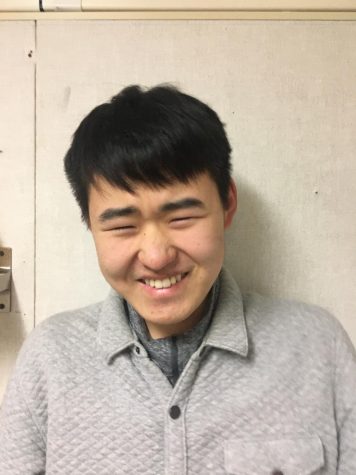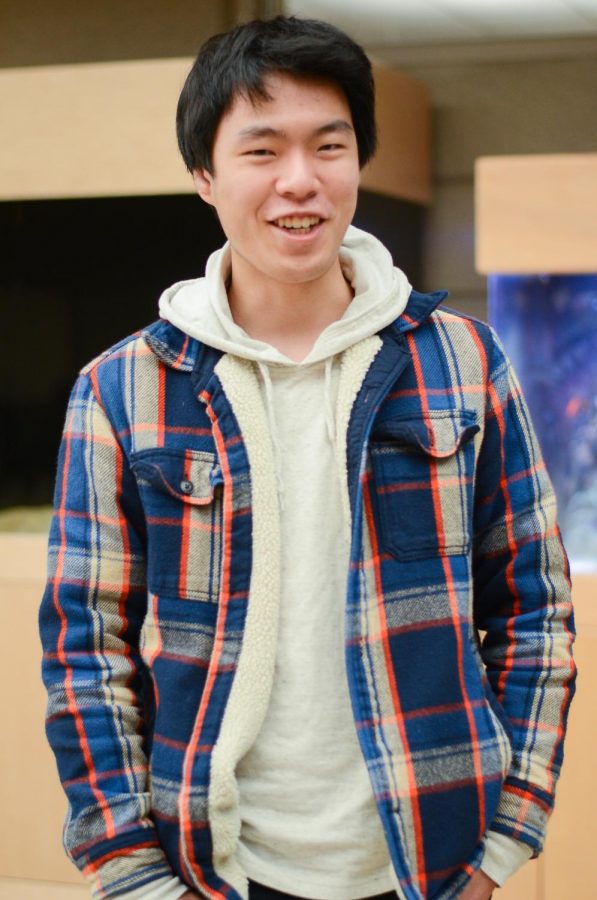Humans of Harker: Persevering with pride
Brian Park reaches out to lift others
“People don’t really notice that I have a hearing disability until I tell them, and the first thing they will usually say is ‘I’m sorry’… Pity gets old very quickly, and I couldn’t imagine what it would have been like for people who have more severe disabilities than I do. And I’d say it’s just an empowering reminder of what people go through every day — what deaf people go through everyday, and how, because I have this perspective, I have a duty to help other people,” Brian Park (12) said.
As Brian Park (12) enters the door of the classroom, he’s swarmed by a mass of children, clamoring with delight at his arrival. The group soon disperses to return to either studying or enjoying some free time. Brian follows and begins tutoring and playing with the kids. This is a scene that plays out every Friday, when Brian goes to volunteer at LifeMoves, an organization that helps impoverished children and families.
“I’d say [my favorite part of volunteering is] working with kids honestly,” Brian said. “I kid around and tend to call them munchkins, but they’re good kids, and I’m pleasantly surprised to find that kind of positivity even when they’re going through things that normal kids don’t go through.”
Brian was referred to LifeMoves from a fellow volunteer from a previous organization that helped kids with Cochlear implants, an electronic device that can process sound signals for those with severe hearing loss. Brian himself also has a hearing disability: his right ear is almost deaf.
“I’ve come to find that people who are at a disadvantage in some way usually tend to feel like no one else understands them,” Brian said. “And as someone who’s gone through something similar to what other people have gone through, I’ve found that volunteering helps that feeling of wanting to help others, of wanting to bring your own experiences and make them into something that can help others.”
He’s motivated by his own experiences of being picked on for his disability during his childhood years.
“I’d say [my experiences have] motivated me to do better in life, to rise above that level of pettiness, to be a bit more of a decent person rather than someone who can just look at another person and just judge them for their disabilities or what they can see,” Brian said.
Brian brings this attitude to school, acting as a trustworthy confidante to his friends.
“He’s a great person to talk to about life,” Eric Wang (12), who’s known Brian since middle school, said. “He sometimes gives me advice, but being such a great listener is more than enough for me usually. If I need a friend who’s got my back, he’s got me.”
Brian’s always the first person to notice a new pair of shoes, a haircut, or a jacket, and he actively tries to make his friends feel better about themselves. Being an attentive friend does not mean Brian hides his own emotions. Rather, he opens up to connect deeper with others.
“When he’s down, he’s definitely not afraid to show it, and it usually prompts a genuine conversation,” Mathew Mammen (12), a Brian’s good friend, said. “He’s open about his feelings… He’s actually willing to be vulnerable.”
Brian was a competitive fencer throughout his middle school years, until sustaining a chronic injury to his hamstring that forced him to withdraw from the competitive circles.
“There was a time during physical therapy when I just wanted to stop, because I was like ‘Oh, what’s the point? I’m not going to get better,” he said. “Eventually, I had to pick myself up off the ground because I couldn’t just stay there. I couldn’t just keep lying there the entire time. And that hurt, but I learned to bounce back, stop moping, continue in life.”
And he did. Brian still fences casually, and his love for the sport lives on in his establishment of the after school fencing classes, a goal of his that allows him to introduce the sport to fellow students.
“So he’s a quiet guy, and it seems like when he tucks into a job, he sticks with it and gets to the end of it. That’s probably what I’d say his greatest strength is, his perseverance,” said William Cracraft, the managing editor of news and information at the upper school, who worked with Brian to get the classes up and running.
Brian brings this dedication with him into whatever he does, but especially into his volunteer work, as he can connect with the kids he helps.
“People don’t really notice that I have a hearing disability until I tell them, and the first thing they will usually say is ‘I’m sorry,’” Brian said. “Pity gets old very quickly, and I couldn’t imagine what it would have been like for people who have more severe disabilities than I do. And I’d say it’s just an empowering reminder of what people go through every day — what deaf people go through everyday, and how, because I have this perspective, I have a duty to help other people.”

Jessie Wang (12) is the senior copy editor for the Winged Post and Harker Aquila. This is his fourth and final year on staff, and he hopes to continue...
Devanshi Mehta is a sophomore and Co-Business/PDA Manager for TALON Yearbook. This is Devanshi's second year on staff. In her free time, Devanshi enjoys...


















![“[Building nerf blasters] became this outlet of creativity for me that hasn't been matched by anything else. The process [of] making a build complete to your desire is such a painstakingly difficult process, but I've had to learn from [the skills needed from] soldering to proper painting. There's so many different options for everything, if you think about it, it exists. The best part is [that] if it doesn't exist, you can build it yourself," Ishaan Parate said.](https://harkeraquila.com/wp-content/uploads/2022/08/DSC_8149-900x604.jpg)




![“When I came into high school, I was ready to be a follower. But DECA was a game changer for me. It helped me overcome my fear of public speaking, and it's played such a major role in who I've become today. To be able to successfully lead a chapter of 150 students, an officer team and be one of the upperclassmen I once really admired is something I'm [really] proud of,” Anvitha Tummala ('21) said.](https://harkeraquila.com/wp-content/uploads/2021/07/Screen-Shot-2021-07-25-at-9.50.05-AM-900x594.png)







![“I think getting up in the morning and having a sense of purpose [is exciting]. I think without a certain amount of drive, life is kind of obsolete and mundane, and I think having that every single day is what makes each day unique and kind of makes life exciting,” Neymika Jain (12) said.](https://harkeraquila.com/wp-content/uploads/2017/06/Screen-Shot-2017-06-03-at-4.54.16-PM.png)








![“My slogan is ‘slow feet, don’t eat, and I’m hungry.’ You need to run fast to get where you are–you aren't going to get those championships if you aren't fast,” Angel Cervantes (12) said. “I want to do well in school on my tests and in track and win championships for my team. I live by that, [and] I can do that anywhere: in the classroom or on the field.”](https://harkeraquila.com/wp-content/uploads/2018/06/DSC5146-900x601.jpg)
![“[Volleyball has] taught me how to fall correctly, and another thing it taught is that you don’t have to be the best at something to be good at it. If you just hit the ball in a smart way, then it still scores points and you’re good at it. You could be a background player and still make a much bigger impact on the team than you would think,” Anya Gert (’20) said.](https://harkeraquila.com/wp-content/uploads/2020/06/AnnaGert_JinTuan_HoHPhotoEdited-600x900.jpeg)

![“I'm not nearly there yet, but [my confidence has] definitely been getting better since I was pretty shy and timid coming into Harker my freshman year. I know that there's a lot of people that are really confident in what they do, and I really admire them. Everyone's so driven and that has really pushed me to kind of try to find my own place in high school and be more confident,” Alyssa Huang (’20) said.](https://harkeraquila.com/wp-content/uploads/2020/06/AlyssaHuang_EmilyChen_HoHPhoto-900x749.jpeg)



